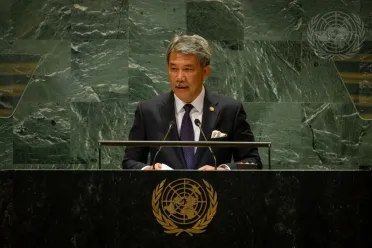Statement
Statement summary
MOHAMAD HASAN, Minister for Foreign Affairs of Malaysia, recalled that nations emerged from the dust of the Second World War with a shared goal to build a safer world. However, for many, it has only become a deadlier world, in which war can be waged remotely and with impunity — a world in which a drone strike can fatally interrupt a lesson in a school, a surgery in a hospital or a convoy delivering humanitarian aid. “It is a world in which the mighty continue to silence the meek with far greater weapons than before,” he said, spotlighting the situation in Gaza, where the mechanisms of the Security Council have been abused to enable mass atrocities. “Our failure to establish a ceasefire is no longer justifiable,” he asserted, citing the willingness to reform as “a matter of life and death for countless innocent people”. The Israeli regime has itself declared its intent to wipe out an entire population. This is, without question, a genocide, he said, demanding that the Council impose an immediate arms embargo against that country.
As Malaysia stands ready to assume the Association of Southeast Asian Nations (ASEAN) chair in 2025, he recognized the Association’s driver’s seat in the Asia Pacific region. Noting that his country’s leadership will focus on the region’s drive for future readiness, he underscored the importance of reinforcing global aspirations, inclusive and people-driven policies and future-oriented mechanisms. Amid the emergence of multilateral pacts affecting the region, Malaysia will aim to fortify ASEAN’s centrality to prevent the region from becoming entrapped in unnecessary geopolitical rivalry or possible escalation. ASEAN’s centrality must also involve managing the most critical issue of the South China Sea as this body of water — rich in resources and carrying vital shipping lanes — has become a flashpoint of rising geopolitical tensions.
He further underscored that the countries of the Global South have continued to be marginalized and remain underrepresented on numerous fronts, including global socioeconomic development, climate mitigation efforts, education, health and infrastructure development. International mechanisms fail to adapt to current realities, often isolating and penalizing developing countries and placing the burden of environmental guilt on them. The lack of infrastructure, technology and resources has prevented developing countries from fully engaging in international systems. Citing equitable access to financing for development as one of the primary challenges, he said innovative and new development financing models that drive sustainability, conservation, climate action and the achievement of the SDGs should be part of new multilateral solutions. The countries of the Global South hold massive potential to further the pursuit of peace and justice worldwide, he observed, adding: “The Global South demands your attention.”
Full statement
Read the full statement, in PDF format.
Photo

Previous sessions
Access the statements from previous sessions.
